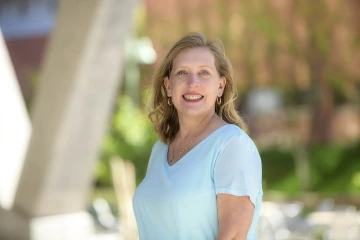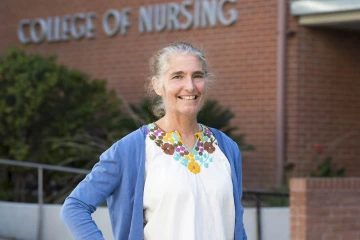Overcoming Obstacles to Improve Maternal Health Care
The nurse-midwifery specialty program is equipping the next generation of maternal health care professionals to meet the challenges that exist today.
Despite the marvels of modern medicine, maternal health is declining in the United States.

Erin McMahon, EdD, CNM, FACNM, founding director of the University of Arizona Health Sciences nurse-midwifery program, seeks to create a diverse workforce representative of the communities most in need of improved maternal health care.
In 2018, the Centers for Disease Control and Prevention estimated that 700 women in the U.S. die from maternal causes each year, but the actual number of deaths climbed to 871 by 2021. A report in 2018 foreshadowed that rise. The Council on Patient Safety in Women’s Health Care reported that only three nations – the U.S., Afghanistan and Sudan – have growing maternal death rates.
“People find it hard to believe that we rank among developing nations in terms of maternal and infant mortality,” said Erin McMahon, EdD, CNM, FACNM, founding director of the University of Arizona Health Sciences nurse-midwife program, which is offered as a specialty in the University of Arizona College of Nursing’s Doctor of Nursing Practice (DNP) degree. “They tell me, ‘No, that can’t be true!’” But it is true, and the number of women who are dying every year is going up.”
Arizona’s maternal health outlook is similar to that of the country at large, as the state’s maternal mortality rate increased over the last decade. Arizona ranks No. 25 in the U.S. with 25.1 deaths per 100,000 live births, according to a report by the Arizona Department of Health Services’ Maternal Mortality Review Program.
Yet, most experts agree that improving maternal health care is possible. The CDC recently reported that 4 in 5 maternal deaths are preventable, and the Arizona Maternal Mortality Review Program previously estimated that 89% of such deaths in Arizona are preventable.
With the launch of the nurse-midwife specialty program, UArizona Health Sciences plans to improve maternal health care by training the next generation of health professionals to overcome the challenges that exist today.
The disproportionate impacts of maternal mortality

In addition to providing maternal healthcare, a nurse-midwife can care for a person throughout their lifespan and address all aspects of their reproductive and sexual health.
Maternal mortality is defined as the death of a woman during pregnancy or soon after the end of pregnancy from a pregnancy complication, a chain of events initiated by pregnancy, or the aggravation of an unrelated condition by the physiologic effects of pregnancy. The CDC suggests that heart disease and stroke cause more than 1 in 3 deaths, with other leading causes of death including infections and severe bleeding.
Increasing maternal mortality rates disproportionately affect people of different races and ethnicities. In Arizona, the overall maternal mortality rate is 25.1 deaths per 100,000 live births. The rate for Hispanic and Latina women is 22.4; Black, Asian and Pacific Islander women have a combined rate of 44; and the rate for Native American and indigenous women jumps to 70.8. For white non-Hispanic women, the rate drops to 17.4 deaths per 100,000 live births.
“We know that this model of care improves outcomes.”
Erin McMahon, EdD, CNM, FACNM
“For women of color, the maternal mortality rate is three to four times that of their white counterparts on a national level,” Dr. McMahon said. “And in some communities, it’s much higher.”
A lack of access to quality maternal health care for those living in rural areas exacerbates the challenges for many medically underrepresented populations. This is especially true in Arizona, where almost three-quarters of the 15 counties are considered rural.
According to a March of Dimes report on 2018 birth data, women in two Arizona counties – Greenlee and La Paz – have no access to maternal care within the county, and women in Graham and Cochise counties have limited access to maternal care.

The nurse-midwifery specialty offered through the College of Nursing’s Doctor of Nursing Practice degree is the only such program offered in the state of Arizona.
“Access to health care is one of the big areas where rural and urban health are divided,” said Lisa Kiser, DNP, CNM, WHNP, an assistant clinical professor in the College of Nursing. “I see it because I work in a rural community twice a week. It’s really something to have to say to somebody, ‘Congratulations, you’re pregnant. Now where do you want to go for your pregnancy care?’ when they are one to two hours away from any of the hospitals.”
The shortage of maternal health providers is not just a rural problem. The field of obstetrics and gynecology (OB-GYN) is experiencing a shrinking workforce, which creates a growing need for nurse-midwives. The American College of Obstetricians and Gynecologists reported that nearly 1 in 3 OB-GYN doctors were aged 55 or older and nearing retirement in 2017. At the same time, younger doctors were trending away from general OB-GYN practice in favor of more specialized fields.
“This has been true since I went to midwifery school, and it has gotten worse,” Dr. Kiser added. “We have to have these conversations at the local, state and national level to bring awareness to the fact that the problem is persisting and getting worse.”
Shaping the future of maternal health care
Drs. McMahon and Kiser believe the nurse-midwifery specialty offered at UArizona Health Sciences is a starting point to saving lives and changing the negative maternal health care trends in Arizona.

Lisa Kiser, DNP, CNM, WHNP, says the nurse-midwifery program will be rooted in local communities to deliver better outcomes for the maternal health challenges that women are facing in those areas.
“A certified nurse-midwife offers a holistic perspective of treating not only the individual, but their constellation of family and support systems,” Dr. McMahon said. “We know that this model of care improves outcomes. It’s not the only solution, but it’s part of the bigger solution.”
The three-year program will produce highly trained nurse-midwives capable of complementing medical doctors, who complete four years of medical school and an additional four years of OB-GYN residency. This will increase the number of providers available to meet women’s health needs.
"The nurse-midwife is trained as an expert in supporting normal, physiologic birth and to be constantly aware of the potential for complications and emergencies to arise,” Dr. McMahon said. “They are perfectly positioned to be that frontline triage care provider for general women's health, general pregnancy and birth care. With the fewer numbers of OB-GYNs we are seeing, increasing the number of trained nurse-midwives will allow physicians to focus on taking care of the more complicated, high-risk patients that may require surgery.”
The nurse-midwifery program welcomed its first three students this fall after receiving pre-accreditation earlier this year. Each student was already enrolled in the College of Nursing’s DNP program. The first class of new DNP nursing students can enter the nurse-midwifery specialty in Fall 2023.
Contact
Blair Willis
Health Sciences Office of Communications
520-626-2101
bmw23@arizona.edu

